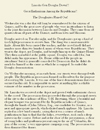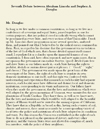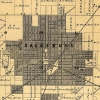Lincoln Douglas Debates
Opposed by a president from his own party, Senator Stephen Douglas (D, Illinois) began the year in 1858 uncertain about his upcoming reelection. Some leaders of the new Republican Party saw this as a great opportunity. Horace Greeley, a leading Republican newspaper editor from New York, talked openly about the possibility of accepting Douglas into the Republican Party. But Abraham Lincoln, a lawyer and party organizer in Springfield, Illinois, objected. So did many Illinois Republicans who were troubled by the idea of Douglas as their new standard-bearer. They had opposed him so often in the past on various policy matters, especially on the question of slavery expansion into the western territories, that they fiercely resisted Greeley's suggestion.
|
|
Lincoln Douglas Debates
On June 16, 1858, the Illinois Republican convention, meeting at the State House in Springfield, endorsed former congressman Lincoln as their "first and only choice" for U.S. Senate. The endorsement of Lincoln was unprecedented. State legislatures were responsible for selecting U.S. senators, and there was no tradition of convention nominations or popular senatorial campaigns. Whatever campaign did take place in 1858 would have to be an indirect one. Democrats did not make any nominations, but most of their legislative candidates pledged to support Douglas. "I shall have my hands full," Douglas said after learning that Lincoln had been nominated to face him. He discovered how full only after returning to Illinois and finding that Lincoln planned to follow him around the state. Lincoln was even suggesting as many as 50 debates. Annoyed but not intimidated, Douglas agreed to what he called seven "joint discussions."
|
|
Lincoln Douglas Debates
The first debate between Douglas and Lincoln occurred in Ottawa, Illinois on August 21, 1858. The town’s population literally doubled overnight as more than 10,000 people arrived to hear the candidates. Banners were everywhere. The diverse crowd strained to hear the open-air debate. Leading Chicago newspapers paid shorthand reporters to take down every word and wired reports across the country. After that first debate, Lincoln admitted, "The fire flew some." Douglas had been on the attack, accusing his opponent of various sins, especially for being too radical on the slavery question, a charge that Lincoln struggled to deny. A week later in Freeport, Lincoln appeared stronger, putting Douglas on the defensive with questions about his views on slavery.
|
|
Lincoln Douglas Debates
By the Jonesboro encounter in mid-September, a pattern was clear. Even though Illinois had no slaves, the 1858 Lincoln-Douglas debates focused exclusively on the fate of slavery. Douglas argued that white people should decide for themselves whether or not to allow it, while Lincoln claimed slavery was immoral and should eventually be abolished. The remaining four debates occurred across central Illinois in what was the most contested belt of the election. Lincoln and Douglas met in Charleston, Galesburg, Quincy and Alton. Douglas led off the final debate in Alton on October 15, 1858 by highlighting his independence and claiming that Lincoln’s House Divided doctrine was a "slander upon the immortal framers of our constitution." He predicted national destruction if the Republicans prevailed. Lincoln replied by arguing that the real "issue" of the contest was "the eternal struggle" between "right and wrong."
|
|
Lincoln Douglas Debates
Nobody knows for sure what impact the great debates had on the 1858 Illinois elections. Republicans won the majority of popular votes in the legislative contests, but since not all legislators were up for election and because the apportionment of seats was imperfect, Democrats retained control of the General Assembly and succeeded in reelecting Douglas. Many observers described the results as a tremendous personal victory for Douglas, because he had not only defeated Lincoln, but also challenged a sitting president from his own party. Lincoln, on the other hand, saw the deepening divisions among Democrats as a good sign for Republicans. "The question is not half-settled," he assured friends after the contest.
|
|



























